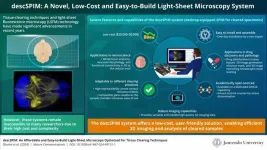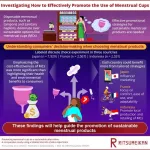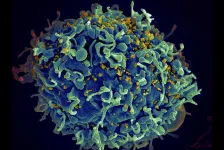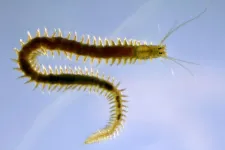(Press-News.org) A modeling study suggests that influential neighbors can be as effective as despotic leaders at promoting social cooperation. Prosocial behaviors can be difficult to sustain in large societies over the long term, as people give into the temptation to defect to strategies that prioritize the wellbeing of themselves and their immediate family. Stefani Crabtree and colleagues constructed a general theoretical framework to explore how cooperation could arise and be maintained in a large society. The authors explore three possible mechanisms for encouraging prosocial actions: neighbors that monitor one another for defection, despotic leaders who monitors and punishes at the whole-society level, and influencers that convince neighbors to cooperate. The authors built mathematical models and simulated individuals playing a common-pool resource game. The simulated society was made up of many types of agents; some agents always cooperated; some always defected; some cooperated and monitored their neighbors for cooperation; and some cooperated only after being caught defecting and punished. In some cases, the authors included influencers, who recruited neighbors to behave prosocially if the influencer found that cooperation resulted in higher individual gains for themselves than defection did. This strategy produced similar results in terms of average agent wealth as the strategies of having a strong leader that prevents detected defectors from ever defecting again. Both influencing and despotic leadership performed much better than monitoring by neighbors. The size of the fine for defecting influenced which strategy was most lucrative, with steep fines promoting cooperation. According to the authors, prosociality can be achieved via a multitude of methods, although punishment of defection is always required.
END
Prosocial influencers can promote societal cooperation
2024-07-02
ELSE PRESS RELEASES FROM THIS DATE:
SRF launches the SYNGAP1 missense account with Nordmoe family donation
2024-07-02
Mill Valley, CA – June 18, 2024 SRF has established a dedicated account to support research regarding SYNGAP1 missense variants. This account is being launched with a $10,000 donation from Dennis and Janet Nordmoe. This is a cause close to their hearts, as their granddaughter Olivia was diagnosed with SYNGAP1-Related Disorder (SRD) caused by a missense variant earlier this year.
Missense Research: Neglected to Date
“Most diagnosed SYNGAP1-Related Disorder (SRD) patients have protein truncating variants (PTV) as opposed to missense variants. Virtually all PTVs are assumed to have the ...
Design and development of a novel light sheet fluorescence microscope
2024-07-02
Three-dimensional (3D) imaging of organs and tissues is vital as it can provide important structural information at the cellular level. 3D imaging enables the accurate visualization of tissues and also helps in the identification of pathological conditions. However, achieving successful 3D imaging necessitates specific prerequisites, including the preparation of 'cleared' tissue samples—biological specimens rendered transparent by removing light-scattering components like lipids to ...
How to promote menstrual cups as an economic and sustainable option
2024-07-02
In recent decades, single-use plastics have pervaded modern societies, causing a significant surge in plastic pollution that exacts a heavy toll on our environment. Addressing this issue requires prioritizing sustainable alternatives to single-use plastics wherever feasible.
Disposable menstrual products are a notable contributor to plastic waste, with billions of sanitary napkins and tampons being discarded every year. Despite the availability of sustainable options like menstrual cups (MCs), consumer preference for single-use products ...
Spotted apex predator being pressured by spotted pack hunters – and it's our fault
2024-07-02
Who’s stronger? A solitary leopard or cackle of hyenas? And which is best at getting along with humans?
University of Copenhagen researchers closely studied this in a large East African natural area surrounded by rural settlements. The study demonstrates that the presence of humans has a direct impact on the competitive relationship between the two large predator species: leopards (Panthera pardus) – the iconic spotted feline and the spotted hyena (Crocuta crocuta) – a kleptoparasite and pack hunter known for its comical ...
True scale of carbon impact from long-distance travel revealed
2024-07-02
The reality of the climate impact of long-distance passenger travel has been revealed in new research from the University of Leeds.
Despite only accounting for less than 3% of all trips by UK residents, journeys of more than 50 miles (one way) are responsible for 70% of all passenger travel-related carbon emissions.
The disparity is even greater when international travel is singled-out: international journeys are only 0.4% of total trips but are responsible for 55% of emissions.
The new research, published today in the journal Nature Energy, also shows ...
Cutting-edge genomic test can improve care of children with cancer
2024-07-02
Whole genome sequencing has improved clinical care of some children with cancer in England by informing individual patient care.
New research from the Wellcome Sanger Institute, Cambridge University Hospitals NHS Trust, Great Ormond Street Hospital, and the University of Cambridge, supports the efforts to provide genome sequencing to all children with cancer and shows how it can improve the management of care in real-time, providing more benefits than all current tests combined.
The study, published today (2 July) in Nature Medicine, ...
Drugs that kill "zombie" cells may benefit some older women, but not all, Mayo Clinic study finds
2024-07-02
ROCHESTER, Minn. — Drugs that selectively kill senescent cells may benefit otherwise healthy older women but are not a "one-size-fits-all" remedy, Mayo Clinic researchers have found. Specifically, these drugs may only benefit people with a high number of senescent cells, according to findings publishing July 2 in Nature Medicine.
Senescent cells are malfunctioning cells in the body that lapse into a state of dormancy. These cells, also known as "zombie cells," can't divide but can drive chronic inflammation and tissue dysfunction linked to aging and chronic ...
New lab test to detect persistent HIV strains in Africa may aid search for cure
2024-07-02
New Lab Test to Detect Persistent HIV Strains in Africa May Aid Search for Cure
A multinational team led by Weill Cornell Medicine investigators developed a test that will help measure the persistence of HIV in people affected by viral strains found predominantly in Africa—a vital tool in the search for an HIV cure that will benefit patients around the world.
The study, published in Nature Communications on July 2, helps fill a major gap in human immunodeficiency virus (HIV) research. Most HIV studies have focused on strains circulating in Western countries, predominantly ...
RecombinHunt: predicting new pandemics through data analysis
2024-07-02
Milan, July 2, 2024 - Combating future pandemics through data analysis of recombinant virus genomes. A study published in the prestigious journal Nature Communication presents the promising results of RecombinHunt, a new data-driven method developed by the Department of Electronics, Information and Bioengineering of the Politecnico di Milano and the University of Milan, which can identify, with high accuracy and computational efficiency, recombinant SARS-CoV-2 genomes with one or two breakpoints.
Recombination, that is, the composition of two or more viral genomes to form a new genome, is an efficient molecular mechanism ...
A new breakthrough in understanding regeneration in a marine worm
2024-07-02
The sea worm Platynereis dumerilii is only a few centimetres long but has a remarkable ability: in just a few days, it can regenerate entire parts of its body after an injury or amputation. By focusing more specifically on the mechanisms at play in the regeneration of this worm’s tail, a research team led by a CNRS scientist1 has observed that gut cells play a role in the regeneration of the intestine as well as other tissues such as muscle and epidermis. Even more surprising, the team found that this ability of gut cells to regenerate other tissue varies according to their location: the closer they are to the posterior end of the ...





